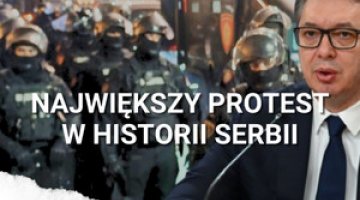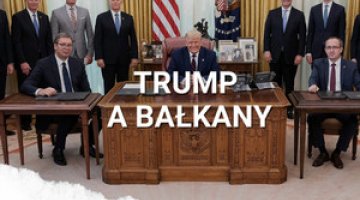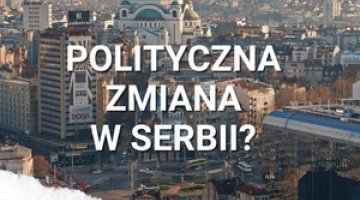Changes in Serbia’s ruling camp
Nikolic owes his victory in this election mainly to the low turnout (46.32%), because Boris Tadic was unable to mobilise his disillusioned electorate. A large part of his electorate either did not go to the polls at all or spoiled their ballot papers as an expression of their protest against the ruling camp (approximately 3.6%). The outcome of this election will complicate and prolong the process of forming a government (parliamentary elections were held on 6 May). The most likely scenario is that the present government coalition will be formed again, with the participation of DS and the Social Democratic Party of Serbia (SPS) along with liberal parties and those representing national minorities. The election of Nikolic as president will not cause any major change in Serbian politics per se, due to the small competences vested in the head of state. The president elect, who owes his victory to the moderate electorate, will also take care to avoid tension in relations with the neighbouring countries and the EU.
People are voting for change
In voting for Nikolic, the Serbian public were not so much showing their support for his agenda; they were rather expressing their dissatisfaction with the preservation of the existing model of governance and the domination of the elite linked to DS and Boris Tadic in the state institutions. Serbs are dissatisfied and disillusioned by the bad economic situation, which results in very high unemployment (approximately 24%).First of all, though, the public protested against the style in which politicians from the Democratic Party had governed the country, believing them to be more focused on image-building successes than on the consistent implementation of reforms. DS was also accused of corruption and nepotism, and its tendency to refer to nationalist rhetoric and its close links with Russia made this pro-European party similar to its rivals from the SNS. Tadic himself was accused of informal and unconstitutional control of the government, the parliament and the media, and thus harming Serbian democracy. However, politicians from DS were convinced that their party, being the only guarantor of Serbia’s pro-European policy, will keep power. The decision to re-form the government coalition in its previous shape after the parliamentary elections on 6 May caused Serbs to decide to either vote for Nikolic or boycott the runoff.
Will Nikolic be a safe alternative?
DS’s calculations turned out to be wrong mainly because the perspective that the opposition could take over power ceased to be a sufficient argument for voters to back them. This came about as a consequence of the change in Nikolic himself, who has developed from a politician with radically anti-European and nationalist views into a moderate supporter of European integration. In 2008, after another electoral defeat, Nikolic ceased to oppose integration with the EU, avoided drawing upon nationalist ideology and attacking the government for the concessions made to Kosovo and reconciliation with neighbouring countries, and instead started supporting Serbia’s integration with the EU more and more frequently. He has also won support by drawing on leftist welfare state ideas, which are popular at a time of economic crisis.
The problem with forming the government
Two weeks earlier, a parliamentary election was held simultaneously with the first round of the presidential election in Serbia. The parliamentary election was won by SNS, the party of the president elect. However, considering the balance of forces in parliament, where centrist and liberal parties predominate, the chance that SNS will be able to form a government are low.
Nikolic’s victory will complicate and may significantly lengthen the process of forming the government coalition. Although the most likely scenario is still that the DS-SPS coalition with the liberal parties and those representing national minorities will be formed again, the choice of the prime minister and the distribution of the ministries will nevertheless cause disputes. The Democratic Party, having lost the presidency, will make attempt to have a strong politician from among its ranks nominated prime minister and for the party itself to maintain control of most of the ministries. This is contrary to Ivica Dacic’s ambitions, who hoped that the excellent result achieved by SPS would guarantee him the position of prime minister and would significantly reinforce his position in the government. If SPS is unwilling to make concessions, it cannot be ruled out that a grand coalition of SNS-DS or – though this is less likely – an SPS–SNS coalition, will be formed.
The consequences
When Nikolic takes office, the Serbian political scene may become destabilised in the short term not only due to the lengthy process of forming a government. This will also affect Serbia’s relations with the EU and the other countries in the region. Nikolic is still seen as a nationalist, which means that EU and Balkan politicians will treat him with great suspicion and distrust at the beginning.
In the longer term, Tadic’s defeat and the breaking of DS’s domination on the political scene may have a positive impact on the process of democratic transformation in Serbia. The period when Tadic was president and DS ruled the country was characterised by total control of the state by the presidential administration due to informal links and influences. The concentration of power in the hands of Tadic and the lack of adequate control from the divided opposition did more harm than good to Serbian democracy despite the formal progress made on the way to integration with the EU. Nikolic himself, who is a pragmatic politician, is likely to avoid tension in relations with Brussels and the countries in the region. Paradoxically, the president elect, who is seen as a nationalist, will have more room for manoeuvre in relations with Serbia’s neighbours. Unlike Tadic, who was forced to constantly prove that he was strongly defending national interests, Nikolic will have more freedom making concessions to Kosovo, Bosnia and Herzegovina, and Montenegro.
Appendix
The presidency of Tomislav Nikolic – outlook
Tomislav Nikolic (born in 1952) co-created the Serbian Radical Party in the 1990s with Vojislav Seselj. In 1998–2000, during the rule of Slobodan Milosevic, he was deputy prime minister in the government of Serbia and later of Yugoslavia. When Seselj was arrested on charges of war crimes, Nikolic took control of SRS. In 2008, he decided to form his own grouping, the Serbian Progressive Party, which is more focused on social and economic issues than on propagating nationalist ideology. Most of the high-ranking politicians from SRS joined his new party.
Nikolic is unlikely to continue the strong presidency style of Tadic who, owing to his dominant position in DS, had full control of government policy. Nikolic’s role will rather be limited to the formal competences vested under the constitution, such as representing the state in international relations, appointing ambassadors and nominating the prime minister. The president will have little impact on the legislative work of the Serbian government and parliament (MPs may overrule the presidential veto by an absolute majority of the votes). The president elect, unlike his predecessor, has also resigned from the position of the president of his party, and his influence on its policy will gradually diminish. This will be the case especially because Nikolic’s statements after the elections indicate that he will make efforts to build his position of a cross-party leader.
In his first announcements, he has declared that the main objectives of his presidency will be the integration of Serbia with the EU and the improvement of the economic situation in the country. However, at the same time, Nikolic rules out recognition of Kosovo’s independence, while good relations with Pristina will certainly be a condition necessary to be met for the launch of accession negotiations with the EU. It cannot be entirely ruled out that, as the economic crisis in Serbia worsens, Nikolic will resume his nationalist rhetoric since this was his distinctive feature before 2008. This tactic, though, would be risky as it was the adoption of a more moderate stance which allowed Nikolic to win the presidential election.





